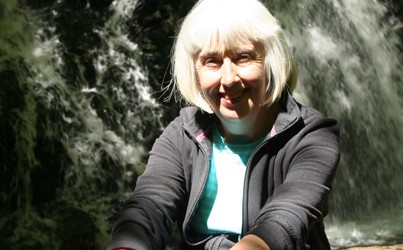A HIGHLAND history student has received a national award for her dissertation on ‘Inverness Lunatic Asylum’.
Mary Souter, from Culloden, has been announced as the winner of the 2013 Royal Historical Society/History Scotland dissertation prize.
The annual award recognises ‘high-quality work done by undergraduates in dissertations on any aspect of Scottish history’.
Mary, who graduated from the University of the Highlands and Islands with a first class Honours degree in Scottish history last year, wrote her dissertation on ‘Highland Madness: Pauper Lunatics in Inverness District Lunatic Asylum, 1864 to 1914′.
She examined the admission, diagnosis and treatment of psychiatric patients to ascertain the impact of racial and cultural factors over the asylum’s first 50 years.
Mary studied her degree with the University’s Centre for History from Inverness College UHI and is now undertaking a postgraduate module, also with the Centre.
As the recipient of this award, she has won £250 and will have her work published in History Scotland magazine.
She said: “Receiving this prize is a great honour and an exciting culmination to four years spent studying Scottish history at the University of the Highlands and Islands.
“It was a big decision for me to give up work and fulfil a long-held ambition to attend university and I am grateful for the encouragement and support of the lecturers teaching on the Scottish History course.
“I think I fully realised the extent of my interest in the subject when I began to eagerly anticipate visits to the local archive centre in search of material for course assignments.
“I found a wealth of primary source material about Inverness District Lunatic Asylum in the form of admission registers, casebooks and administrative and inspection reports.
“As I began the research, it became apparent that the worthy Victorians campaigning for an asylum for the northern regions believed there was something different about Highland madness.
“They argued that particular factors caused or exacerbated mental illness and disability in these remote areas. Extreme poverty, genetic weakness, superstitious beliefs and difficulties in treating Gaelic speakers were some of the concerns raised.”
Mary continued: “An asylum to serve the Highlands and Islands became a priority and the Inverness Asylum was one of the first public asylums built after the Lunacy (Scotland) Act of 1857.
“Opening in 1864, it mainly received ‘pauper lunatics’ who relied on parochial boards to pay for their care.
“In my dissertation I examined the admission, diagnosis and treatment of patients to ascertain the impact of Highland racial and cultural factors over the asylum’s first 50 years.
“I found that, although practices in the asylum were shaped significantly by broader social, political and medical contexts, perceptions of racial and cultural difference also influenced diagnosis and treatment.”
History Scotland editor, Dr Alasdair Ross, was one of the three judges. Speaking on behalf of the panel, he said: “Choosing the winner of the 2013 Royal Historical Society/History Scotland dissertation prize was an exceedingly difficult task this year, mainly because of the high quality of the entries.
“All three judges were, however, unanimous in their choice of winner. This project combined superb archival research with excellent prose to create an always enthralling dissertation in a relatively untouched field of study.”
Dr David Worthington, head of the University of the Highlands and Islands Centre for History, said: “We’re very proud of Mary’s achievement and absolutely delighted that she’s been given this award. Her dissertation revealed a very important aspect of the history of Inverness District Lunatic Asylum from 1864 to 1914 and was a first-rate piece of historical writing.
“Mary should be encouraged and supported to prepare some of this material for publication now, since it tells us a great deal about Inverness and wider Highland history in the decades leading up to the First World War.”
Dr Crichton Lang, deputy principal of the University of the Highlands and Islands, added: “We are delighted that Mary has received this award.
“Our Centre for History plays an important part in researching the history of the Highlands and Islands and this award is a national recognition of the quality of our students, staff and research.
“I’m glad our staff support graduates to achieve at this high level and I would like to congratulate Mary on her achievement.”
The University of the Highlands and Islands was ranked as the fifth-best place to study history in Scotland in the recent Guardian University Guide 2015 league table.
To find out more about the history courses it offers, visit www.uhi.ac.uk
ENDS
MEDIA RELEASE issued by the University of the Highlands and Islands. You too can post your story ideas for journalists (aka press or media releases), on allmediascotland.com. Email info@allmediascotland.com for more information.
Check out twitter.com/nonstopstories. Check out too our brand new twitter.com/allEducationPR.
Contact: Susan Szymborski
Phone: 01463279222
Email: susan.szymborski@uhi.ac.uk
Website: http://www.uhi.ac.uk






